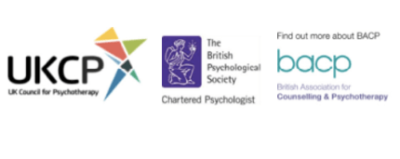Quality Standards in the UK – Do You Need a Registered Therapist?
by Andrea M. Darcy
Notice certain official logos repetitively appearing on websites when seeking a therapist? Or read that a counsellor or psychotherapist is ‘registered’? What is this about, and how does it affect you?
What is a ‘registered therapist’?
A registered therapist is a counsellor, counselling psychologist, or psychotherapist who has attained the sufficient advanced level of education, training, and level of experience to be offered a membership with a regulatory board or ‘association’ in their country.
Psychotherapists, counsellors, and counselling psychologists in the UK can be registered with more than one institution.
But can I trust these regulatory boards?
The main membership associations in the UK for counsellors, counselling psychologists, and psychotherapists are highly established and reliable institutions. They are all themselves listed with the Professional Standards Authority.
Why should I care if a therapist is registered somewhere?
Yes, therapy associations in the UK act as support systems for therapists, but really they exist for you the client.
The membership associations for therapists exist to make sure counselling and psychotherapy is an accessible, safe, and useful experience for general public.
They achieve this by:
- creating strict ethical frameworks that therapists must commit to
- providing resources and guidance to members so they can be better therapists
- monitoring training programs to ensure they provide the best skills to new therapists
- provide information about counselling and psychotherapy to the general public
- stay on top of changes in the field and keep your therapist informed and current
- commission research around the practice of therapy
- work to influence government policies so that therapy is more accessible.
In summary, the membership associations for therapists are there to make sure your therapist is constantly providing you with the best possible support.
Practical ways you can benefit
You can turn to one of the psychotherapy membership associations if you:
- want to read about how therapy can help you
- would like to see a list of accredited therapists you can contact
- would like to research a therapist you’ve been working with
- feel your therapist has been unethical and would like to make a complaint
- are interested in being a counsellor or psychotherapist yourself, and would like to know how to start and what schools to consider.
So who are these associations and how do they differ?
 In the UK, there are three main membership registries, and several others for specialised kinds of psychotherapy.
In the UK, there are three main membership registries, and several others for specialised kinds of psychotherapy.
Note that these boards do not register personal coaches, who are not strictly regulated in the UK. Although they can join different membership associations.
UKCP – UK Council for Psychotherapy
Over 8000 individual therapists belong to this registrar.
In order to be on the UKCP registrar, a therapist must have studied at an institution accredited by the UKCP.
*So if a therapist is registered with the UKCP, you know they have a good level of training from a reputable institute, college, or university.
British Association for Counselling and Psychotherapy – BACP
The BACP has over 40,000 members and was formed over 40 years ago.
BACP accepts members who are students or retired who can then benefit from their resources. But of course they only recommend you work with at therapist who qualifies for their three ‘registered’ memberships, which set very high standards in the industry. They include the following:
Main Category – Registered Member (MBACP)
If your therapist has this membership, they have completed a BACP accredited course. Sometimes, if someone took a course that is not included in the BACP list, they can take a ‘Certificate of Proficiency’ to be at this level.
*If you are on a low budget and are happy to work with someone who is certified but maybe doesn’t have many years of experience yet, then look for this minimum level.
Accredited – Registered Member (MBACP Accred)
To be at the accredited level, a therapist goes through a rigorous application and assessment process over several months.
*A good quality standard to look for in any therapist. It means you are working with an experienced practitioner who has demonstrated their talent for working with clients and for maintaining high ethical standards.
Senior Accredited – Registered Member (MBACP Sn Accred)
This is a high level of membership for those practitioners who not only have extensive experience but have a specialist area they are accomplished in.
*As a client seeking a therapist, this might be important if you have a certain mental health diagnosis and you’d like to work with someone who really understands your issues well.
BPS – The British Psychological Society
The BPS has been around for an impressive 110 years. Similar in their rigorous accreditation and commitment to public outreach as the BACP, they differ in that they focus on psychologists only.
*As a client, this means that if you are interested in working with a counselling psychologist, this would be the registry you would want to access.
[Not sure how a counselling psychologist differs? Read our article, “What is a Counselling Psychologist?“]
The BPS provides memberships at many levels including ‘student’, ‘affiliate’, and ‘graduate’. But there is only one membership that means a psychologist is recommended for practice:
Chartered Member (CPsychol)
This involves a high level of psychological knowledge and expertise. To achieve this membership a therapist must:
- have a honours degree at a high level then undertaken post-graduate studies at a BPS accredited institution
- or, have post-grad training and experience teaching psychology or have completed research to a doctoral level.
Royal College of Psychiatrists
Representing over 15,000 psychiatrists, this is the professional body to check with if you are choosing to work with a psychiatrist over a psychotherapist (the difference being that a psychiatrist in the UK can prescribe medication and has a medical degree as well as studying psychology).
Look for the following membership levels:
Specialist Associateship (MRCPsych)
Denotes minimum of ten years experience in psychiatry, and has specialist training which was either undertaken in the UK or has been assessed as an equivalent.
Fellowship (FRCHPsych)
Awarded to psychiatrists who have been members for at least 10 years and who are recognised as having made a significant contribution to the field of psychiatry.
ACP – Association of Child Therapists
To be registered with the ACP, a child psychotherapist must complete a NHS child mental health training that is a minimum of four years long.
*This is the registrar to refer to if you are seeing a therapist who works with children and adolescents.
Looking for a registered therapist? Harley Therapy puts you in touch with registered therapists who work from three London locations. Overseas? online therapy works wherever you may be.
Want to ask a question about quality standards? Or share an experience? Use the comment box below.







Do watch out for the photograph your therapist has. Despite all credentials, if they are posed seductively, in black and white, posed and artistic, you are seeing someone already selling themselves, with all that that implies. Not all therapists are saviours, some want to be Gods. Be careful. They should be aware of how their work affects their client and their clients family etc, especially if children are involved. When they do refuse to consider this and focus only on their client…if they are too invested in being a rescuer and ignore the effects of their grandiose issues, do not have a therapy plan to integrate family into things…run.
Hi there Andy, sounds like you are very angry at a therapist. We are wondering though, is this a therapist you actually went to? And actually know personally? Or maybe it’s a therapist of an ex of yours you are having issues with? It’s just that it comes across as misplaced. We certainly agree that not all therapists are great at their job. Therapists are humans, and like with any job, doctor, politician, lawyer… sometimes there is malpractice. Of course a proper registered therapist is supervised. But making a dig at a therapist’s photo and insinuating that a photo being black and white or that they are trying to be seductive seems a bit far reaching. And one-on-one therapy is about focusing on the client. That’s the point. If you want family therapy, we’d recommend you talk to your partner/ex partner and agree to go to family therapy together. It would be a good place to look at where all this rage comes from, and to learn how to find ways forward.